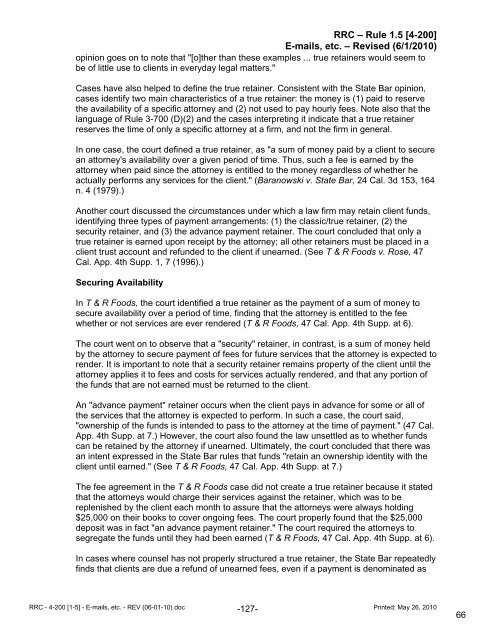Sorted by Commenter - Ethics - State of California
Sorted by Commenter - Ethics - State of California
Sorted by Commenter - Ethics - State of California
You also want an ePaper? Increase the reach of your titles
YUMPU automatically turns print PDFs into web optimized ePapers that Google loves.
RRC – Rule 1.5 [4-200]<br />
E-mails, etc. – Revised (6/1/2010)<br />
opinion goes on to note that "[o]ther than these examples ... true retainers would seem to<br />
be <strong>of</strong> little use to clients in everyday legal matters."<br />
Cases have also helped to define the true retainer. Consistent with the <strong>State</strong> Bar opinion,<br />
cases identify two main characteristics <strong>of</strong> a true retainer: the money is (1) paid to reserve<br />
the availability <strong>of</strong> a specific attorney and (2) not used to pay hourly fees. Note also that the<br />
language <strong>of</strong> Rule 3-700 (D)(2) and the cases interpreting it indicate that a true retainer<br />
reserves the time <strong>of</strong> only a specific attorney at a firm, and not the firm in general.<br />
In one case, the court defined a true retainer, as "a sum <strong>of</strong> money paid <strong>by</strong> a client to secure<br />
an attorney's availability over a given period <strong>of</strong> time. Thus, such a fee is earned <strong>by</strong> the<br />
attorney when paid since the attorney is entitled to the money regardless <strong>of</strong> whether he<br />
actually performs any services for the client." (Baranowski v. <strong>State</strong> Bar, 24 Cal. 3d 153, 164<br />
n. 4 (1979).)<br />
Another court discussed the circumstances under which a law firm may retain client funds,<br />
identifying three types <strong>of</strong> payment arrangements: (1) the classic/true retainer, (2) the<br />
security retainer, and (3) the advance payment retainer. The court concluded that only a<br />
true retainer is earned upon receipt <strong>by</strong> the attorney; all other retainers must be placed in a<br />
client trust account and refunded to the client if unearned. (See T & R Foods v. Rose, 47<br />
Cal. App. 4th Supp. 1, 7 (1996).)<br />
Securing Availability<br />
In T & R Foods, the court identified a true retainer as the payment <strong>of</strong> a sum <strong>of</strong> money to<br />
secure availability over a period <strong>of</strong> time, finding that the attorney is entitled to the fee<br />
whether or not services are ever rendered (T & R Foods, 47 Cal. App. 4th Supp. at 6).<br />
The court went on to observe that a "security" retainer, in contrast, is a sum <strong>of</strong> money held<br />
<strong>by</strong> the attorney to secure payment <strong>of</strong> fees for future services that the attorney is expected to<br />
render. It is important to note that a security retainer remains property <strong>of</strong> the client until the<br />
attorney applies it to fees and costs for services actually rendered, and that any portion <strong>of</strong><br />
the funds that are not earned must be returned to the client.<br />
An "advance payment" retainer occurs when the client pays in advance for some or all <strong>of</strong><br />
the services that the attorney is expected to perform. In such a case, the court said,<br />
"ownership <strong>of</strong> the funds is intended to pass to the attorney at the time <strong>of</strong> payment." (47 Cal.<br />
App. 4th Supp. at 7.) However, the court also found the law unsettled as to whether funds<br />
can be retained <strong>by</strong> the attorney if unearned. Ultimately, the court concluded that there was<br />
an intent expressed in the <strong>State</strong> Bar rules that funds "retain an ownership identity with the<br />
client until earned." (See T & R Foods, 47 Cal. App. 4th Supp. at 7.)<br />
The fee agreement in the T & R Foods case did not create a true retainer because it stated<br />
that the attorneys would charge their services against the retainer, which was to be<br />
replenished <strong>by</strong> the client each month to assure that the attorneys were always holding<br />
$25,000 on their books to cover ongoing fees. The court properly found that the $25,000<br />
deposit was in fact "an advance payment retainer." The court required the attorneys to<br />
segregate the funds until they had been earned (T & R Foods, 47 Cal. App. 4th Supp. at 6).<br />
In cases where counsel has not properly structured a true retainer, the <strong>State</strong> Bar repeatedly<br />
finds that clients are due a refund <strong>of</strong> unearned fees, even if a payment is denominated as<br />
RRC - 4-200 [1-5] - E-mails, etc. - REV (06-01-10).doc -127-<br />
Printed: May 26, 2010<br />
66












![Proposed Rule 4.1 [N/A] “Truthfulness in Statements to Others” - Ethics](https://img.yumpu.com/19037854/1/190x245/proposed-rule-41-n-a-truthfulness-in-statements-to-others-ethics.jpg?quality=85)



